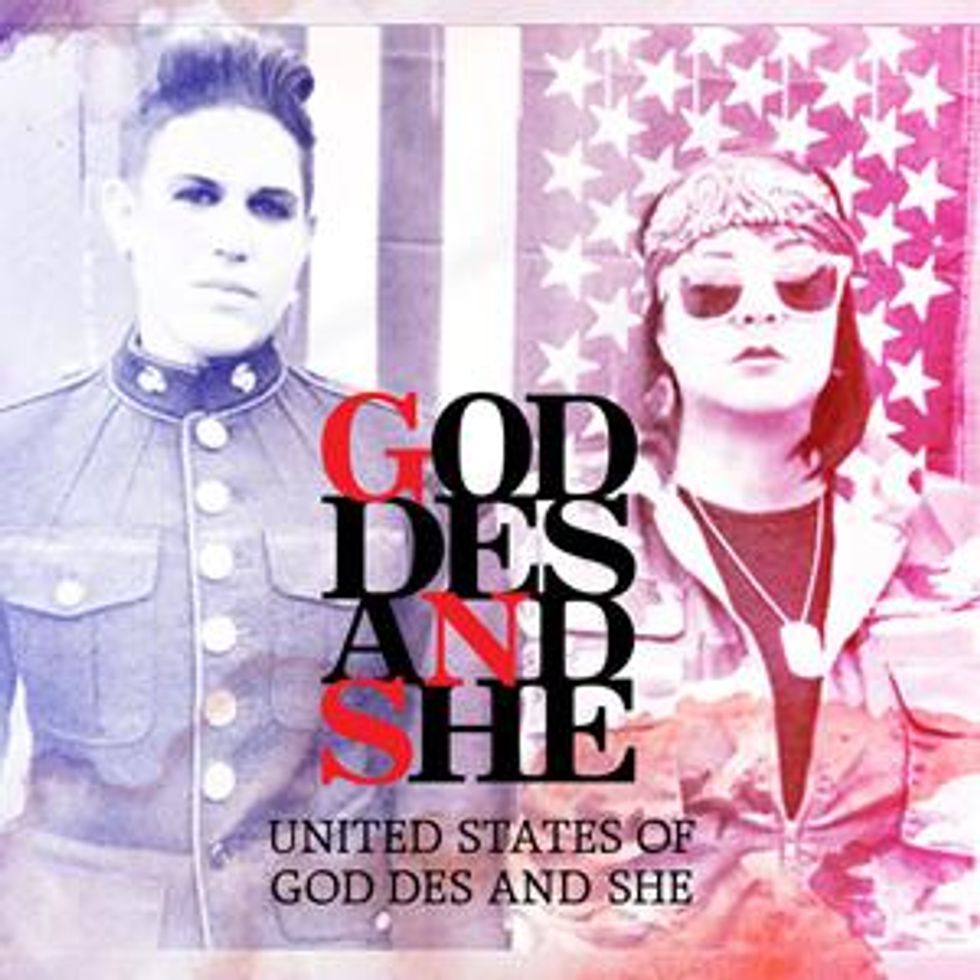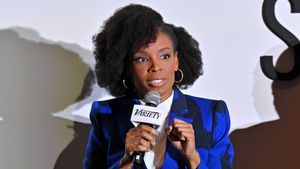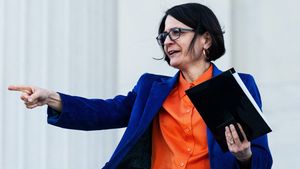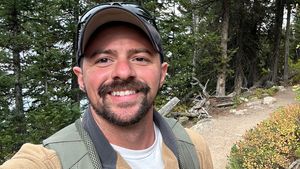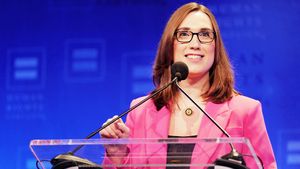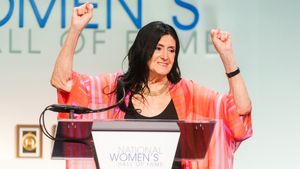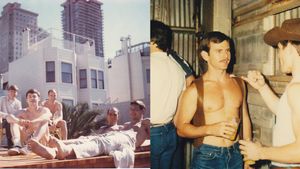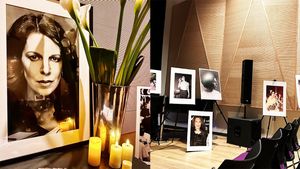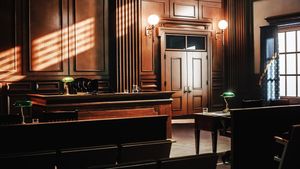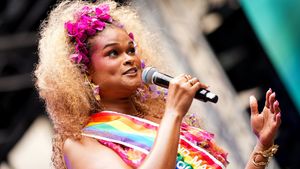SheWired: So how are you guys feeling about the album?
God Des: We’re just really, really excited to put out something we’re so proud of. There’s so many different sounds, and styles, and topics that we cover on the record, so we’re just really excited for folks to hear it. We really feel like we pushed the envelope on this one.
Absolutely. I certainly I would never say that either of you have been soft-spoken, but this seems to be the most politically driven album you've released. Do you agree with that?
God Des: Yeah. I think for the first record we did, it was very outspoken as well, but it was...
She: In a different way.
God Des: It wasn’t as mature-sounding. We were just doing it because we loved it at that point, but haven’t really developed our sound yet. So we feel like this is great, because we really feel like we know what our sound is now, and it's so politically driven. Yeah, it's definitely the most outspoken [album].
So why do that type of album now? Especially given some of the electoral victories we saw in the last election?
She: We started writing this record a long time ago, actually. We’ve been working on it for a couple of years, so it's kind of interesting how it all kind of came to a head when there were victories and stuff. But for us, at the time we were writing, there was no victory. There was a lot of fear and we were very afraid Romney might be getting into office. And there still tons of things that are wrong — like the "Don't Say Gay" bill in Tennesee, or the fact that in California they can’t ban the gay "reparative therapy." Those things are really real and still exist.
God Des: And the fact that gay folks still can not marry in this country is insane. And until that day happens — even when that does happen — there's still overcoming all the stereotypes. I mean, after segregation finished, there are still a lot of issues with racism. So it's going to take time and awareness and bringing visibility to issues, and we feel like it's our duty as musicians to do that. And so that’s what we did with this record.
I think you succeeded at that. Some of your songs, like "Never Give Up," certainly seem to speak to LGBT youth, and kids who are being bullied. Did either of you have any experiences with being bullied, or taking crap for your orientation or your presentation?
God Des: I was always really different. I was such a tomboy when I was growing up. I went to this farm school in Michigan, in a small town with a big farming community. And people just were really really racist, and would say these things that I just didn’t understand. My family was very liberal, and musicians, so I was exposed to any type of person you can imagine — gay folks, every ethnicity and religion. So from an early age, I really hated it and didn’t understand why people were like that. [I remember] being a girl trying to compete with all these guys, and that initial stereotype of "I can't do it because I was a girl," made me feel injustice really early on.
In high school I started to really dress a lot more feminine and grow my hair out. But then I was friends with the only black kid in my school, and I would get KKK letters in my locker, and people would say "white power" to me and threaten to kill him and really horrible stuff.
So it just opened my eyes to realize that the world is really cruel, and the older I got, as I got into college, I realized that a lot of it just came from ignorance — truly that people didn’t know gay folks, or they didn’t know people of color. In college, I really made it my duty to dialogue with people that were homophobic or whatever, and just try to open up their mind and change their perspective… Then that idea that they are really homophobic starts to dwindle, and it does the same with race, or religion.
And She, how about you? Any experiences with bullying or harassment?
She: Oh god, I mean, I was called fat from a very early age. It’s so hard, especially when you’re in middle school and high school. I just kind of withdrew. I was a music-playing geek, and music was my escape and my salvation. I became the girl with the voice, instead of the fat girl — it was really a great transition for me, and I realized that my voice can kind of shield me from people saying mean things to me, or being cruel to me.
You get so afraid of what anyone’s going to say, and I can't imagine growing up, just thinking about what it would be like as a kid today, where it's instant, and to everyone, and you don’t even have the guts to say it to somebody's face, or around somebody. That is terrifying to me. And probably one of the reasons for the gigantic lack of empathy, because it's so impersonal.
I’ve always been pretty feminine, and I really didn’t even come out until late in my life… If I’m honest, I’m a gay man inside. I wish I could marry a gay man, and live happily ever after, and decorate together…If I could magically make myself into a gay man, that’s what I would be. That’s what really I am. [Laughs] I’ve always been — I wouldn’t say a fag hag, but along those lines. I think that that’s where I’ve always felt the most comfortable. If I could really be a drag queen — I just found that Ana Matronic [of the Scissor Sisters] was. I didn’t know you could do that — I might have to try.
Like a cisgender drag queen?
She: Yeah! I didn’t know! I had no idea. And now that I know that, I’m like, oh my god, that might be something I have to look in to. Because I just love it, so hard. I mean, in real life, I’m like one step away from running from the ball and back.
I think you’re probably not the only queer femme who feels like that.
She: See?!
I've been there too. I really I love show tunes, and I just feel like I should be a gay man, or marry a gay man — but they’re not interested in me. So it’s a catch-22.
She: I know!
God Des: You guys are in a really hard place right there.
More on next page...
\\\
(Continued)
I know you guys wouldn’t answer this question last time we spoke, but is your relationship strictly professional? Would you go on record about that at all?
She: Well, we always like to keep it a mystery. I always say stuff like, “Hey mister, she's my sister.” We keep it very ambiguous as to what we are.
God Des: We don’t like to define our relationship. It can't really be put into a box. You know it’s kind of like blurry. I think it’s better that way too, honestly.
On the opening track, you call out to the silent majority. Who are the silent majority? And why do you believe that they’re silent?
She: What I meant by that is just the people that just are working, living their life, and don’t really have an opinion against gay people. Or they’re like, “They’re cool, I’m cool with it,” but they're not going to a pride rally, or supporting in any way verbally, or making it known to anyone that they’re totally fine with it. I choose to believe that a lot of people are that, and given you know the right venue or pathway…
God des: Tools or resources.
She: Thank you, those are the words! [Given those tools,] they would speak up and say, “Hey, no, this is fine with me, you know. I don’t mind my kids being around a gay teacher, or my pack leader being a gay man. It's fine, they are regular folks just like everyone else, who choose different things.” And I think that people that are really hateful are the most verbal, and they’re out there, and you get a different, warped perception of what the majority is, just because those are the people out there screaming on the mountaintops, like “Oh my god, gay f****ts!” But you know, a lot of people are just like “Oh god,” rolling their eyes, going about their life and not feeling that way at all.
God Des: Other people can persuade [you], too. I would never vote for a candidate that was antigay. I wouldn’t do that, that’s not [everyone's] biggest issue. They're just thinking about whatever they think is going to effect them financially, or for their healthcare, for their guns, or for whatever it is. It turns into this thing where we feel like everybody hates gay folks; but we feel that’s not what’s swaying people deciding to vote, or to be vocal in their lives.
Right, I agree. I think it seems like we are not as much of a wedge issue as we once were, as the recent electoral victories demonstrated.
God Des: Yes, absolutely.
She: And I think if we found a way to get those folks to be more verbal, I think there would be a shift, of the people that are hateful and the people who are super-bigots, would feel less apt to be so vocal. And like they might just shut the fuck up, and just keep it to myself. Look, I don’t care what values people believe. Screw you. Don’t push it on me or other people that don’t want to hear that crap. I don’t know how to do that, and I don’t know what that means, but it would be really great if we could figure out a way to do this nonchalantly, without having it be a big process. People could just be like, “Yeah, totally. It's fine. Get over it. Why are we talking about it? It's 2013.”
Why are we even talking, why is this a conversation? It’s civil rights — let people do what they want. No one's hurting anyone here. No one's hurting your marriage. If your marriage is in trouble for this? It’s already been in trouble. [Laughs]
So, do you both identify as queer? Or do you have other identities you prefer to self-associate with?
She: I like queer.
God Des: I identify as fucking queer! With an exclamation point or three! Three exclamation points! [Laughs.]
What do both of you like about that identity? I agree with you — that’s the identity I claim, but I think there is some resistance to that identity, and I think some of it is generational. But what makes that identity appealing to each of you?
God Des: Because I don’t think that’s limiting. I think that to just say that you’re one thing, that’s really limiting. And I am kind of anti-conformity, period. So yeah, I feel like queer is all-inclusive and to me, that is anything; it's just anything outside of the complete norm. So, I just don’t like the limits. I know I’m a butch dyke, and in fact somebody [in an interview] just called me a hardcore butch dyke…
She: It’s funny because if they ever met her for 5 minutes; like, who kills the spiders? She [not God Des] kills the spiders! She kills all the spiders. You can write that down.
God Des: If somebody gets mad that I wear makeup, that makes me want to wear it more. And if someone’s mad that I don’t wear makeup, then that makes me not want to wear it more. I don’t want to ever be one thing where I have to look like this, and I have to have this hair, and I have to do these things. I don’t believe in that. Some days, I want to put on some Dickies and a baseball hat, and other days, I want wear a tight v-neck and some boots. I just like to be who I am with no restrictions.
I totally agree, and think "queer" makes space for all of those things, and it creates an opportunity for anybody who's felt kind of different and othered. Have you ever feel kind kind of queer? Then c'mon — there’s space for you under our big giant rainbow umbrella.
She: And we’re not going to hate on you for whatever it is. That’s awesome — think about that for a minute. That would be super awesome if people could just not judge each other, and just be cool with whatever, and not feel superior because somebody else is lesser. That’s not cool, dude. So boring. Stop it.
Follow SheWired on Twitter.
Follow SheWired on Facebook.
